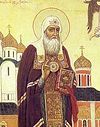

| Previous day | Next day |
| Old Style
February 17
|
Friday |
New Style
March 2
|
|
2nd Week of Great Lent.
Tone 5.
Great Lent. |
Monastic rule: xerophagy (bread, uncooked fruits and vegetables).
|
![]() Great-martyr Theodore the Tyro (306).
Great-martyr Theodore the Tyro (306). ![]() St. Hermogenes, patriarch of Moscow and all Russia (1612).
St. Hermogenes, patriarch of Moscow and all Russia (1612).
St. Mariamne, sister of Apostle Philip (1st c.). Uncovering of the relics of Martyr Menas the Most Eloquent, of Alexandria (889). St. Theodore the Silent, of the Kiev Caves (13th c.). St. Barnabas, elder, of Gethsemane Skete of St. Sergius Lavra (1906).
New Hieromartyr Paul Kosminkov, archpriest, of Lystsevo (Moscow) (1938).
Weeping “Tikhvin” Icon of the Most Holy Theotokos, St. Elias Skete, Mt. Athos.
St. Auxibius, bishop of Soli on Cyprus (102). St. Finan, bishop of Lindisfarne (661). St. Theodosius, monastic founder at Mt. Kelifarevo (1363), and his disciple St. Romanus (14th c.), of Turnovo (Bulgaria). New Martyr Michael Mavroeidis of Adrianople (1490). New Martyr Theodore of Byzantium, at Mytilene (1795). New Hieromartyr Theodore of Adjara, hieromonk, at Mt. Athos (1822). St. Nicholas Planas, priest, of Athens (1932). Synaxis of Holy Emperor Marcian (457) and St. Pulcheria, his wife (453).
Repose of Elder Agapitus of the Kiev Caves (1887) and Schemamonk John (Shova) of Kolitsou Skete, Mt. Athos (2009).
Thoughts for Each Day of the Year
According to the Daily Church Readings from the Word of God
By St. Theophan the Recluse

Friday.
My Spirit shall not always strive with man, for that he also is flesh (Gen. 6:3).[1] Man has two opposing forces inside, but one consciousness—the human being. The characteristics of this being are determined by his inclinations. If he sides with the Spirit, he is spiritual; if he sides with the flesh, he is fleshly. The spirit does not disappear altogether even from the fleshly, but it is enslaved, and has no voice. It becomes yoked, and serves the flesh like a slave serves its mistress, inventing all sorts of pleasures for it. Similarly, the flesh does not disappear from the spiritual, but it submits to the spirit and serves it. It loses its natural rights for food through fasting, its rights for sleep through vigil, for rest through continuous labour and weariness, for pleasing the feelings through seclusion and silence. Where the flesh reigns, God does not abide; for His organ of communication with man is the spirit, which is not given its due priority in the flesh. God’s approach is felt for the first time when the spirit begins to claim its own through the operation of the fear of God and one’s conscience. When consciousness and freedom also come to help, then God communicates with man and begins to dwell in him. From that moment on begins the inspiration of the soul, the flesh and of the entire inner and outer man, while God becomes all in all in him. By becoming spiritual, man is made divine. What a marvellous benefit, and how little it is remembered, valued and sought after!
[1]The Slavonic for Gen. 6:3 reads: My Spirit shall not eternally be scorned by men, because they are flesh.
Articles
 Greatmartyr Theodore the Tyro (“the Recruit”)In memory of this occurrence, the Orthodox Church annually celebrates the holy Great Martyr Theodore the Recruit on the first Saturday of Great Lent. |
 Martyrs Menas the Most Eloquent, Hermogenes, and Eugraphus, of AlexandriaThe Holy Martyrs Menas, Hermogenes, and Eugraphus suffered for their faith in Christ under the emperor Maximian (305-313). |
 St. Auxibius Bishop of Soli, CyprusSaint Auxibius was born at Rome in a rich family. He was raised with his brother Tempstagoras, and from an early age he displayed remarkable talents. |
 New Martyr TheodoreThe Holy New Martyr Theodore was born of pious parents in Neochorion near Constantinople in 1774. He worked in the palace of the Sultan, where he converted to Islam. |






